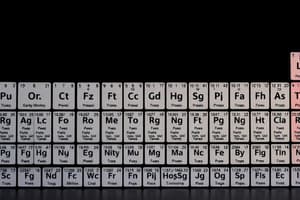Podcast
Questions and Answers
What is the characteristic of alkali metals in terms of ionization energy?
What is the characteristic of alkali metals in terms of ionization energy?
- Variable ionization energy
- High ionization energy
- No ionization energy
- Low ionization energy (correct)
Which of the following is a physical property of alkaline earth metals?
Which of the following is a physical property of alkaline earth metals?
- Higher density and hardness than alkali metals (correct)
- High reactivity with air and water
- High density and softness
- Poor conductors of electricity and high reactivity
What is the product of the reaction between an alkali metal and water?
What is the product of the reaction between an alkali metal and water?
- Alkali metal chloride and chlorine gas
- Alkali metal nitrate and nitrogen gas
- Alkali metal hydroxide and hydrogen gas (correct)
- Alkali metal oxide and oxygen
What is the electron configuration of alkaline earth metals?
What is the electron configuration of alkaline earth metals?
Which group of elements has a higher melting and boiling point?
Which group of elements has a higher melting and boiling point?
What is the reaction between an alkali metal and chlorine?
What is the reaction between an alkali metal and chlorine?
What is the primary reason for the high reactivity of alkali metals?
What is the primary reason for the high reactivity of alkali metals?
What is the general equation for the reaction of an alkali metal with oxygen?
What is the general equation for the reaction of an alkali metal with oxygen?
What is the product of the reaction between an alkaline earth metal and water?
What is the product of the reaction between an alkaline earth metal and water?
What is the general equation for the reaction of an alkali metal with an acid?
What is the general equation for the reaction of an alkali metal with an acid?
What is the product of the reaction between an alkaline earth metal and chlorine?
What is the product of the reaction between an alkaline earth metal and chlorine?
What is the general equation for the reaction of an alkali metal with nitrogen?
What is the general equation for the reaction of an alkali metal with nitrogen?
Flashcards are hidden until you start studying
Study Notes
Alkali Metals
- Group 1 elements: Lithium (Li), Sodium (Na), Potassium (K), Rubidium (Rb), Caesium (Cs), Francium (Fr)
- Highly reactive, lose one electron to form a positive ion (cation)
- Highly electropositive, low ionization energy
- Low melting and boiling points, soft and lightweight
- React vigorously with water, releasing hydrogen gas
Alkaline Earth Metals
- Group 2 elements: Magnesium (Mg), Calcium (Ca), Strontium (Sr), Barium (Ba), Radium (Ra)
- Less reactive than alkali metals, lose two electrons to form a positive ion (cation)
- Less electropositive, higher ionization energy than alkali metals
- Higher melting and boiling points, harder and denser than alkali metals
- React less vigorously with water, but still release hydrogen gas
Physical Properties
- Alkali metals:
- Low density, soft, and lightweight
- High reactivity, react with air and water
- Good conductors of electricity
- Alkaline earth metals:
- Higher density, harder, and more dense than alkali metals
- Less reactive, but still react with air and water
- Poorer conductors of electricity than alkali metals
Chemical Reactions
- Alkali metals:
- React with water: 2M (alkali metal) + 2H2O → 2MOH (alkali metal hydroxide) + H2
- React with chlorine: 2M (alkali metal) + Cl2 → 2MCl (alkali metal chloride)
- Alkaline earth metals:
- React with water: M (alkaline earth metal) + 2H2O → M(OH)2 (alkaline earth metal hydroxide) + H2
- React with chlorine: M (alkaline earth metal) + Cl2 → MCl2 (alkaline earth metal chloride)
Electron Configuration
- Alkali metals: [noble gas] ns1 (one electron in outermost energy level)
- Alkaline earth metals: [noble gas] ns2 (two electrons in outermost energy level)
- Both groups have a full outer energy level, except for the one or two electrons in the s subshell
Studying That Suits You
Use AI to generate personalized quizzes and flashcards to suit your learning preferences.




